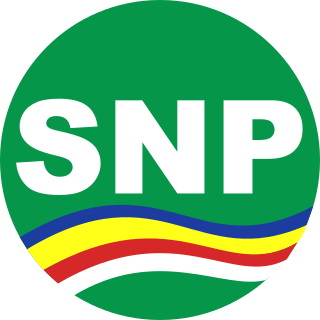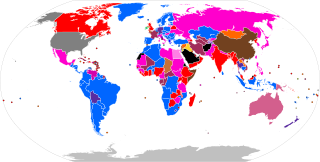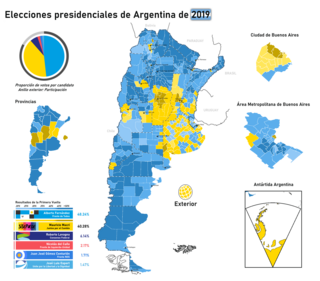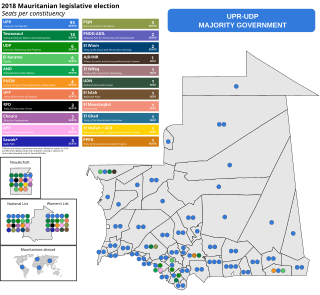Presidential election | |
 |
|---|
General elections are due to be held in Seychelles in 2025. [1]
Presidential election | |
 |
|---|
General elections are due to be held in Seychelles in 2025. [1]
The President of Seychelles is elected using the two-round system; [2] if no candidate receives a majority of the vote in the first round, a second round is held between the top two candidates.
Members of the National Assembly are elected by two methods; 26 (with a new constituency established in 2020) are elected from single-member constituencies using first-past-the-post voting, and up to a further ten are elected based on the percentage of votes received by each party; for each 10% of the total national vote received, a party gets one additional seat. [3] [4]

The two-round system (TRS), also known as runoff voting, second ballot, or ballotage, is a voting method used to elect a single candidate. The first round is held using simple plurality to choose the top-two candidates, and then in the second round the winner is chosen by majority vote. The two-round system is widely used in the election of legislative bodies and directly elected presidents.
Parallel voting is a type of mixed electoral system in which representatives are voted into a single chamber using two or more different systems, most often first-past-the-post voting (FPTP) with party-list proportional representation (PR). It is the most common form of mixed member majoritarian representation (MMM), which is why these terms are often used synonymously with each other. In some countries, parallel voting is known as the supplementary member (SM) system, while in academic literature it is sometimes called the superposition method within mixed systems.

The Seychelles National Party(SNP) is a liberal political party in Seychelles. Its followers emphasize active multiparty democracy, respect for human rights and liberal economic reforms. It was founded in response to what it called the "totalitarian regime" of former President France-Albert René. It publishes a newsletter called Regar, which is frequently sued for libel by government officials. On Regar's front page of every issue is a quote from the constitution of Seychelles invoking their right to freedom of speech and freedom of expression.

Elections in Angola take place within the framework of a multi-party democracy. The National Assembly is directly elected by voters, while the leader of the party or coalition with the most seats in the National Assembly automatically becomes President.

Romania elects on a national level a head of state – the president – and a legislature. The president is elected for a five-year term by the people. The Romanian Parliament has two chambers. The Chamber of Deputies has currently 330 members, elected for a four-year term by party-list proportional representation on closed lists. The Senate has currently 136 members, elected for a four-year term by party-list proportional representation on closed lists.

Elections in Botswana take place within the framework of a multi-party democracy and a parliamentary system. The National Assembly is mostly directly elected, and in turn elects the President and some of its own members. The Ntlo ya Dikgosi is a mixture of appointed, hereditary and indirectly elected members.

At the national level, the Republic of Cyprus holds elections for its head of state, the President of Cyprus, and for its legislature, the House of Representatives.

Elections in Guinea-Bissau take place within the framework of a multi-party democracy and a semi-presidential system. Both the President and the National People's Assembly are directly elected by voters.

All elections in the Czech Republic are based on the principle of universal suffrage. Any adult citizen who is at least 18 years old can vote, except those who have been stripped of their legal capacities by a court, usually on the basis of mental illness. Elected representatives are elected directly by the citizens without any intermediaries. Election laws are not part of the constitution, but – unlike regular laws – they cannot be changed without the consensus of both houses of the Parliament. The Czech Republic uses a two-round plurality voting system for the presidential and Senate elections and an open party-list proportional representation system for all other elections. The proportional representation system uses the Sainte-Laguë method for allocating seats.
Elections in Hungary are held at two levels: general elections to elect the members of the National Assembly and local elections to elect local authorities. European Parliament elections are also held every 5 years.

General elections were held in Zambia on 19 December 1968 to elect the National Assembly and President. The first post-independence polls saw incumbent Kenneth Kaunda retain his post as president, whilst his United National Independence Party, the only party to field candidates in all 105 constituencies, won 81 of the 105 seats in the National Assembly. Voter turnout was 82.5% in the parliamentary election, but 87.1% in the presidential election.

An electoral system or voting system is a set of rules that determine how elections and referendums are conducted and how their results are determined. Electoral systems are used in politics to elect governments, while non-political elections may take place in business, non-profit organisations and informal organisations. These rules govern all aspects of the voting process: when elections occur, who is allowed to vote, who can stand as a candidate, how ballots are marked and cast, how the ballots are counted, how votes translate into the election outcome, limits on campaign spending, and other factors that can affect the result. Political electoral systems are defined by constitutions and electoral laws, are typically conducted by election commissions, and can use multiple types of elections for different offices.

General elections were held to in the Central African Republic on 22 August 1993, with a second round on 19 September 1993. They followed the previous year's elections, the results of which had been voided by the Supreme Court due to irregularities.

Presidential elections were held in the Seychelles between 19 and 21 May 2011, commencing on the Outer Islands on 19 May, with Inner Islands voting on 20 May and Mahé on 21 May. The result was a victory for incumbent President James Michel of the Seychelles People's Progressive Front, who received 55% of the vote in the first round.

General elections were held in Uruguay on 26 October 2014, alongside a constitutional referendum. As no presidential candidate received an absolute majority in the first round of voting, a runoff took place on 30 November. Primary elections to determine each party's presidential candidate had been held on 1 June.

Parliamentary elections were held in Seychelles from 8 to 10 September 2016. Three parties and three independent candidates ran for the 25 directly-elected seats. The result was a victory for the opposition Linyon Demokratik Seselwa alliance, which won 19 of the 33 seats. It was the first time since the 1979 elections that the People's Party did not win a majority of seats.

General elections were held in Argentina on 27 October 2019, to elect the president of Argentina, members of the national congress and the governors of most provinces.

Parliamentary elections were held in Mauritania in September 2018; the first round took place on 1 September, with a second round held on 15 September. At the national level, elections were held in 157 constituencies, each electing one member to the National Assembly. Elections were also held in 13 regional councils and 219 municipalities.

General elections were held in Seychelles on 22–24 October 2020 to elect the President and members of the National Assembly. The National Assembly elections had been due in 2021, but in July 2020 were brought forward by President Danny Faure in order to hold them together with the presidential elections, a proposal supported by opposition parties.

General elections are due to be held in Malawi in 2025.